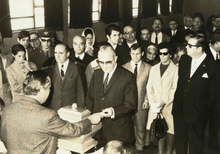|
1969 Portuguese legislative election
Parliamentary elections were held in Portugal on 26 October 1969.[1] The elections were announced on 12 August, and were the first under Prime Minister Marcello Caetano, appointed in the previous year to replace long-term Prime Minister António de Oliveira Salazar, who had been left incapacitated after a stroke. The quasi-sovereign National Union won all seats with an official turnout of 62.5%. Electoral systemThe constitution of 1933 stated that elections were to be held in all of Portugal's 18 constituencies by majority party list system, with all seats in each constituency going to the party list with a plurality of votes. In order to select a specific candidate, voters were formally able to strike out names. The electoral law of 5 December 1958 (rearranged to allow for the National Assembly to appoint the president) guaranteed universal suffrage for all mature, literate citizens, but unofficially curtailed female participation. All natural-born nationals residing in Portugal for the previous five years were allowed to stand for election. The Chamber of Corporations, consisting of 200 members or more, was appointed by the government following the election to the National Assembly. Although Caetano had made some effort to blunt the harsher edges of the regime, the election took place in an environment little different from the past 40 years. Numerous opposition candidates bowed out of the race prematurely due to reportedly extensive harassment and voter manipulation. After the election, the government banned the two opposition "electoral commissions" and ordered them dissolved.[2] PartiesThe major parties involved and the respective leaders:
Results 
ReferencesSee also |
|||||||||||||||||||||||||||||||||||||||||||||||||||||||||||||||||||||||||||||||||||||||||



